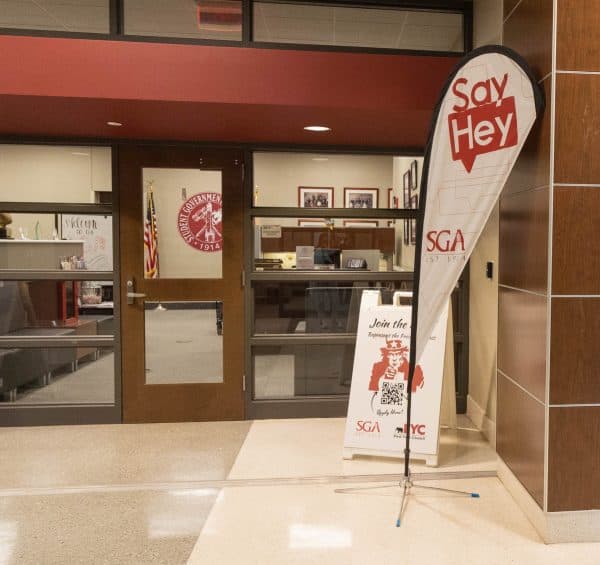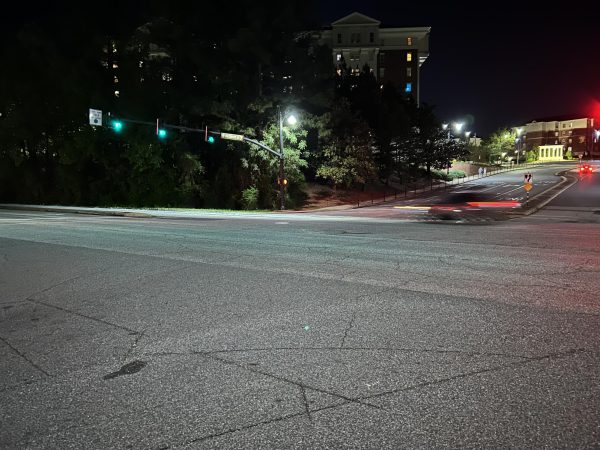New details in Strip shooting emerge; Miles’ attorneys argue self-defense
Courtesy of the Tuscaloosa County Sheriff's Office
Darius Miles’ and Michael Davis’ mugshots.
February 22, 2023
Editor’s Note (2/23/23): This article was updated to include a statement from an attorney representing Brandon Miller
The small court room in the Tuscaloosa County Jail was standing room only 30 minutes before the scheduled start of the hearing. It was one of those unseasonably warm and humid Alabama February days. The court room was sweltering; when someone turned on the air conditioning, someone sitting in the rows of benches broke the silence, jokingly calling them a hero.
Then, clad in orange and cuffed, Darius Miles shuffled into the room. He quickly took a seat on the right side of the room, not taking much time to look around — although, in such a small courtroom, not much time would be needed to take in the people there to hear what would be over three hours of testimony.
Not long after, Michael Davis was shown in, wearing the same orange jumpsuit. As he approached the defenses’ table, he drew a heart through the air with his fingers, looking at his family sitting in the back rows.
Court began early — the proceedings were well underway by 9 a.m., the original scheduled start time. The defense’s table was covered in thick books, manila folders and papers; the district attorneys’ table was comparably bare, with one laptop and one notepad folio for both.
Brandon Culpepper, the lead investigator on the case from the Tuscaloosa Violent Crimes Unit, was the first called to the stand, and the heat didn’t stop new information regarding the events that led up to the shooting death of Jamea Harris on Jan. 15 from being revealed. Nor did it stop the defense from accusing the state of lacking probable cause when it arrested Davis and Miles.
Investigator testimony
According to testimony given by Culpepper, all the parties involved in the deadly shooting were at Twelve25, a bar on the Strip, at some point in the night.
Brandon Miller, a standout basketball player for Alabama, dropped his now-former teammate Miles off, but didn’t stay because the line was “too long.”
Harris; her boyfriend, Cedric Johnson; and her cousin, Asia Humphrey left Twelve25 and made their way to Quick Grill across the street to get some food. They met Davis when he began “dancing” in front of the Jeep they were in.
Culpepper said the exchange between Davis and Johnson became heated; Miles’ defense attorney Mary Turner said that Bradley said in one of his statements to investigators that Miles tried to calm Davis down. Turner said Miles saw a gun being passed to someone in the car before he and Davis left, but Culpepper pointed out that he could have seen food being passed around.
At 1:38 a.m., following the interaction with Johnson, Harris and Humphrey, Miles texted Brandon Miller, who was inside Twelve25, asking for his gun: “I need my joint [gun],” along with slang that the defense said implied Miles felt that he was threatened.
After this, Davis, Bradley and Miles walked off and met up with Miller at the location of the eventual shooting on Grace Street, where Miles told Davis the location of his gun, which police say was in Miller’s car. Miles admitted to owning the gun used by Davis.
After this, Culpepper said, Davis allegedly approached the Jeep, firing multiple rounds, one of which went through the Jeep’s windshield, striking Harris in the head. Johnson fired back with his own weapon, shooting Davis in the shoulder with another bullet grazing his hip.
Investigator Ryan Behel said that eight .40-millimeter shell casings and a “projectile fragment” were recovered at the scene of the shooting. He also said that they found four spent rounds in Johnson’s .45-millimeter Judge revolver that was used to return fire.
Immediately after the shooting, Johnson drove the Jeep onto The University of Alabama’s campus, where he made contact with a UAPD officer at the Walk of Champions. Harris was already deceased by the time Johnson reached the police officer.
Defense arguments
Both Turner and John Robbins, who is representing Davis, argued that Davis and Miles were acting in self-defense, saying they felt threatened after the previous encounter with Johnson. Turner pointed to the text messages Miles sent to Miller as proof of her point. Culpepper refuted this, noting that neither had indicated in their interviews with investigators that they felt threatened at any point.
The defense repeatedly pressed Culpepper to provide reasons why Johnson, Harris and Humphrey did not leave the area after their initial encounter with Miles and Davis. District attorneys argued that Johnson, who is not from Tuscaloosa, was not familiar with the area — an assertation that Turner pushed back on. Turner pointed out that Humphrey, Harris’ cousin who is also a student at The University of Alabama, would have been able to give directions if asked.
Humphrey was also called to testify during the hearing and said during her time on the stand that Johnson never asked her for directions while he was driving. She also testified that Johnson began shooting because they were being shot at.
Tuscaloosa District Attorneys maintained their position that Davis had been the first to shoot, but Turner and Robbins cast doubt on that, claiming that Johnson could have been the aggressor, that both Miles and Davis felt threatened, and that the state had failed to show probable cause when the men were arrested on the capital murder charges.
Changing stories
Immediately following the shooting, investigators said that Miles dialed 911, telling the operator that his friend — Davis — had shown up to his apartment after being shot. Police were dispatched to University Downs, where Miles told the responding police officers that he didn’t know how Davis had been shot and that he hadn’t been present when the incident occurred, while Davis said later that he had been inebriated, and didn’t know what happened.
Later on, Culpepper said, Miles changed his story and said that he and his girlfriend had gone to pick Davis up from the downtown area after he was shot.
Culpepper said that after Miles was told police had pulled surveillance footage from the scene, he admitted being present at the scene of the shooting. He later admitted to contacting Miller about the gun, and to owning the gun.
Involvement of Brandon Miller
Culpepper said during his testimony that Miller had been interviewed by investigators after the shooting. Miller said during those interviews that he didn’t actually see the shooting occur, nor had he seen anyone in possession of a gun. The gun used by Davis was allegedly retrieved from the back of Miller’s car.
The extent of Miller’s involvement in the series of events that led to Harris’ death was previously unknown before the hearing. Miller, a top-10 finalist for the Julius Erving award, is in the midst of an eye-catching freshman campaign in Tuscaloosa, leading the SEC in scoring at 18.7 points per game. However, news of his involvement in the events that led to Harris’ death has led to outcry on social media, with some calling for his removal from the Alabama squad.
Before the start of Alabama’s game against South Carolina the same day as the hearing, Alabama men’s basketball head coach Nate Oats took the podium and ended up addressing the situation.
“We knew about that. Can’t control everything everybody does outside of practice,” Oats said. “Nobody knew that was going to happen. Brandon hasn’t been in any type of trouble nor is he in any type of trouble in this case. Wrong spot at the wrong time.”
People quickly condemned Oats’ take on the situation, and Oats released a written statement later to clarify his remarks.
“I thought it was important for me to clarify the unfortunate remarks I made earlier,” Oats’ statement read. “This entire time I’ve tried to be thoughtful in my words relative to this tragic incident, and my statements came across poorly. We were informed by law enforcement of other student-athletes being in the vicinity, and law enforcement has repeatedly told us that no other student-athletes were suspects—they were witnesses only. Our understanding is that they have all been fully truthful and cooperative. In no way did I intend to downplay the seriousness of this situation or the tragedy of that night. My prayers continue to go out to Jamea Harris’s family.”
Tuscaloosa chief deputy District Attorney Paula Whitley said, “That’s not a question I can answer. There’s nothing we could charge with him according to the law,” when asked about why Miller wasn’t charged.
The day after the hearing, Jim Stanridge, an attorney representing Miller, released a statement “to provide additional facts on Brandon’s behalf in response to misstatements in reporting yesterday regarding Brandon.”
The statement acknowledged that Miller was giving Miles rides the night of the shooting, and that Miles had asked Miller to come pick him around midnight.
“Before Brandon arrived to pick up Mr. Miles, Mr. Miles and the individual with Ms. Harris apparently exchanged words,” Stanridge wrote. “Without Brandon knowing any of this context, and as Brandon was already on the way to pick up Mr. Miles, Mr. Miles texted Brandon and asked him to bring him his firearm.”
The statement went on to say that once Miller arrived at the scene, he didn’t get out of his car or interact with Harris or her companions.
“Brandon never touched the gun, was not involved in its exchange to Mr. Davis in any way, and never knew that illegal activity involving the gun would occur,” Stanridge wrote.
Family takes the stand
Towards the end of the hearing, the mothers of Miles and Davis took the stand in support of setting bond for their sons.
Davis’ mother said she was concerned about her son’s well-being while in prison, saying he had needed to go back to the hospital twice since his arrest, and that the bullet that caused his injury was still in his shoulder. Miles’ mother, a 24-year veteran of the Washington, D.C., police force, testified that her son had never been arrested, and that she would ensure he met any release conditions that were set.
By the end of the hearing, the room had cooled off. The heat, however, remained in the words of Turner as she argued, unsuccessfully, to set bond for Miles. The heat of the court room didn’t stop both young men from breaking down in tears when the judge gaveled the hearing to a close.











